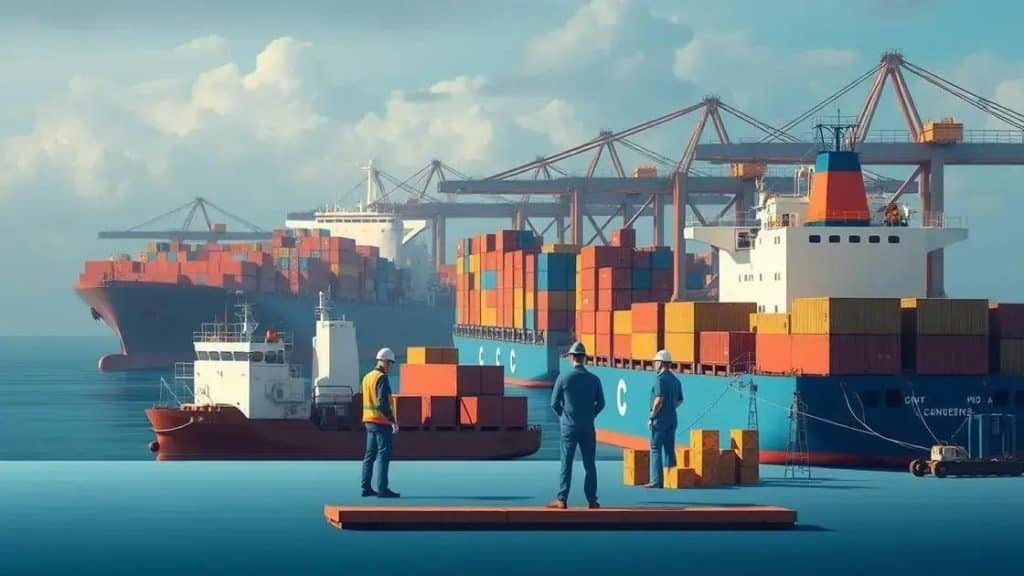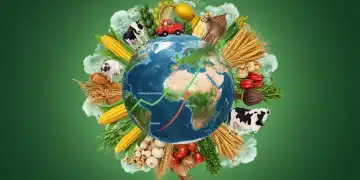Import-export regulations on agricultural goods you need to know

Import-export regulations on agricultural goods significantly impact supply chains by increasing costs and complicating compliance, while ensuring safety and quality through required documentation.
Import-export regulations on agricultural goods can be complex, yet they are essential for navigating global markets. Curious about how they affect your trade practices? Let’s dive in!
Understanding import-export regulations
Understanding import-export regulations is essential for anyone involved in international trade. These rules not only ensure compliance with local laws but also facilitate smooth transactions across borders. Knowing the key aspects of these regulations can empower you to operate confidently in the global market.
What Are Import-Export Regulations?
Import-export regulations are rules established by governments to control the flow of goods across borders. They are designed to protect local economies, health standards, and environmental concerns. Compliance with these regulations is crucial for legal trading.
Key Elements of Regulations
Several key elements form the backbone of import-export regulations. It’s important to understand these components to ensure you meet all requirements:
- Documentation: Proper paperwork is essential, including invoices, permits, and licenses.
- Tariffs and Duties: Know the applicable tariffs and duties that may affect your costs.
- Standards Compliance: Ensure that your products meet the necessary health, safety, and environmental standards.
- Prohibited Goods: Be aware of items that are restricted or banned from import or export.
Keen knowledge of these elements will help you navigate the complexities of international trade. Understanding local laws and the regulations in your trading partner’s country will also influence the importing process.
Another critical aspect involves the continual change in import-export regulations. Since these rules are often updated or revised, staying informed is vital. Regularly checking with trade authorities keeps you ahead of any changes that could impact your business.
Building relationships with customs officials can also provide you with valuable insights into the regulations. They can guide you on best practices and any upcoming changes in policies. By fostering these connections, you’ll be more prepared to adapt to shifting regulations.
Investing time to understand these multiple facets of import-export regulations goes a long way. Not only does it enhance your compliance but also boosts your confidence in engaging with the global market.
Key documents required for agricultural trade

When engaging in agricultural trade, knowing the key documents required is vital for smooth transactions. These documents ensure compliance with regulations and help avoid delays during customs processes.
Essential Documents
Several essential documents must be prepared for import-export transactions:
- Commercial Invoice: This is a detailed bill for the goods sold, including quantities, prices, and terms of sale.
- Bill of Lading: This document acts as a contract between the shipper and the carrier, detailing the transportation of goods.
- Import/Export Licenses: Depending on the country and specific goods, special licenses may be required to legally conduct trade.
- Health Certificates: These are necessary for agricultural products to prove they meet local health and safety standards.
Understanding each document’s purpose is crucial for successful trading. The commercial invoice outlines the specific details of the transaction, while the bill of lading serves as proof of shipment. Additionally, import/export licenses ensure that traders operate within legal boundaries.
Another important component is the health certificate. For example, when exporting fruits, this document confirms that the produce meets the health requirements of the destination country. Ensuring all documents are accurate and complete can significantly reduce the risk of customs delays.
While gathering documents, it’s helpful to keep everything organized. Using a checklist can streamline the process, ensuring you have all necessary documents ready for presentation at customs.
Moreover, be prepared for varying requirements based on countries involved in trade. Each nation may have distinct regulations and documentation standards for agricultural goods. Therefore, staying updated on any changes to these rules is essential for continued compliance and success in agricultural trade.
Common challenges in complying with regulations
Complying with import-export regulations poses various challenges for businesses involved in agricultural trade. Understanding these obstacles can help traders prepare better and develop strategies to overcome them.
Regulatory Complexity
The complexity of regulations is often the first hurdle traders face. With laws varying greatly between countries, maintaining compliance can be daunting. Each nation has its own set of rules regarding tariffs, quotas, and documentation. This makes it essential for traders to stay informed about the regulations applicable to different markets.
Documentation Requirements
Another common challenge is the extensive documentation required for compliance. Essential papers include:
- Health and Safety Certificates: These documents ensure that agricultural products meet specific health standards.
- Customs Declarations: Accurate declarations are essential to process shipments and avoid penalties.
- Import and Export Licenses: Obtaining the right licenses can be time-consuming and may require significant attention to detail.
- Commercial Invoices: Precision in invoicing is critical to meet regulatory expectations.
The demand for accurate documentation often leads to delays in shipments and increased costs. Missing or incorrect documents can result in fines, shipment returns, or even confiscation of goods.
Additionally, fluctuations in regulations can create uncertainty. Frequent changes in trade policies or tariffs can leave traders in a difficult position. They must adapt quickly to these changes to maintain compliance and avoid disruptions in the supply chain.
Communication barriers can also be a significant challenge. When dealing with foreign partners, language differences may lead to misunderstandings regarding regulations. Misinterpretations can increase compliance risks and complicate relationships.
Lastly, some businesses grapple with inadequate resources to manage compliance effectively. Smaller companies might lack the staff or expertise needed to navigate complex regulations. This can result in oversights that could jeopardize their operations.
The impact of regulations on global supply chains

The impact of import-export regulations on global supply chains is significant. These regulations dictate how goods are transported across borders, affecting businesses at every level.
Disruption of Supply Chains
One major effect of regulations is the potential disruption in supply chains. For instance, when new regulations are introduced, companies may face delays in shipping goods. This is particularly true for agricultural products, which often have a limited shelf life.
Increased Costs
Compliance with regulations can also lead to increased operational costs. Businesses may need to invest in additional resources to meet documentation standards or to adapt their processes to comply with new laws. Some of the increased costs include:
- Training: Employees may require training to understand new regulations and compliance processes.
- Supply Chain Modifications: Changes may need to be made to logistics to align with regulatory requirements.
- Compliance Audits: Regular audits may become necessary to ensure adherence to evolving regulations.
The financial burden can especially impact small and medium-sized enterprises (SMEs) that lack the resources to easily absorb these costs. As a result, many SMEs may struggle to remain competitive in the international market.
Moreover, regulations can create barriers to entry for new players in the agricultural sector. Understanding complex regulations can be daunting for newcomers. The need for specific licenses, permits, and compliance checks could deter potential entrants and reduce competition.
Another aspect to consider is the variation in regulations between countries. Different compliance requirements can complicate international trade, especially for businesses trying to establish a presence in multiple markets. Companies must remain agile to navigate varying standards effectively.
Lastly, despite these challenges, regulations can lead to benefits as well. Stricter regulations may improve product quality and safety, ultimately building consumer trust. Ensuring that products meet local standards can enhance a brand’s reputation and lead to increased sales.
FAQ – Frequently Asked Questions about Import-Export Regulations in Agricultural Trade
What are the main challenges of complying with import-export regulations?
The main challenges include increased costs, complex documentation requirements, and the need to stay updated on regulatory changes.
How do import-export regulations affect supply chains?
Regulations can disrupt supply chains by causing delays, increasing operational expenses, and creating barriers for new entrants in the market.
Why is proper documentation important in agricultural trade?
Proper documentation ensures compliance with regulations, helps avoid delays in customs, and confirms that goods meet health and safety standards.
What should businesses do to effectively manage changes in regulations?
Businesses should regularly monitor regulatory updates, invest in training, and maintain good communication with customs authorities to adapt swiftly.





